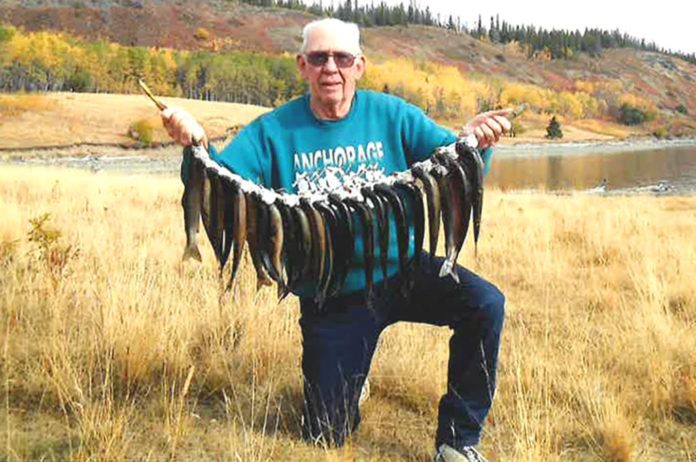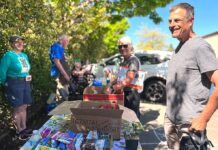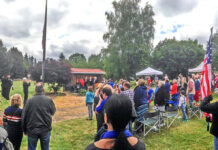Although the Korean War Armistice had been signed several years earlier, tensions became frayed whenever peace talks faltered. That is what Army Second Lieutenant Norm Parker found when he arrived in Korea on July 27, 1957, for a 13-month tour. He was assigned to the 52nd Field Artillery Battalion, where he served as a forward observer and survey officer. This put him within 20 miles of the DMZ (Demilitarized Zone), about halfway between the capital of South Korea, Seoul, and the DMZ. Norm said that when training exercises put the artillery within a couple of miles of the DMZ to get a feel for the terrain the North Korean outposts “we watched the North Koreans marching, playing music and waving their flags across on the other side of the half-mile no-man’s land, the boundary between the two countries.” The Battalion trained with six guns in each battery. As the guns were fired, a forward observer, like Norm, sent needed corrections to hit the intended targets to the fire direction center.
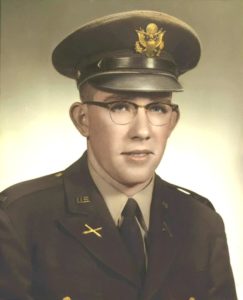
One assignment sent Norm to Okinawa for a ten-day jungle survival course, which he then taught at his base. It included repelling down a cliff, jumping from a tower, crawling under live fire, going through a gassed structure, and other combat type experiences. “We also had a two or three-day escape-and-evade exercise with only one C ration meal where we practiced what we had been taught, including which bugs and plants were safe to eat. We operated in pairs and were tracked and chased by the enemy.”
A highlight in Korea for Norm was the Bob Hope show at I Corp headquarters. He still remembers a story Hope told, “When I was escorted here today in one of your open jeeps, I noted that when we passed rice fields near villages, there was a very bad smell. I asked my captain escort what that smell was, and he told me the farmers spread human waste with dippers from a bucket to fertilize the fields. I asked him I understood that, but what in the world did they mix with it to make it smell so bad?” He and the scantily clad girl with him got lots of laughs.
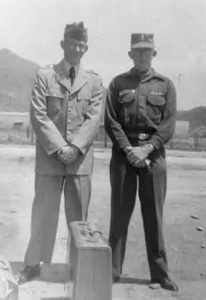
Norm’s unit was reorganized into a 4.2-inch mortar unit in the 1st Calvary Division. He said his camp was surrounded by a wire fence with a guarded entrance. “We lived in tent type barracks. When in camp, in the evenings, we went to the officers club where drinks were 25 cents.” He said the countryside was hilly with country small villages and many rice paddies. Korea had been occupied by Japan during the Second World War and had suffered very badly. After the Korean War and additional trauma, the population was very downtrodden. Major buildings in Seoul and other major cities had been bombed and partially destroyed with a lot of displaced people. On a couple of trips to Tokyo, he saw a dramatic difference in the industry of Japan and its population and the very slow Korean recovery. While in Korea, he was promoted to First Lieutenant. Upon his return to Ft. Ord, California, he received the Division Commander Certificate of Achievement as the top junior officer for his battalion for his service in Korea.
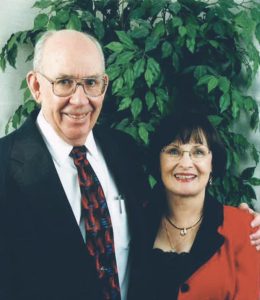
Norm is highly respected in Tualatin for his leadership in the Tualatin Historical Society, Tualatin’s Winona Grange and the Tualatin Methodist Church. He was actively involved in Tualatin City’s acquisition of the Tualatin Heritage Center building and moving it to its present location near the Tualatin Police Department. He was born in British Columbia, Canada, on March 10, 1934. His dad was a pioneer in the remote central part of B.C. in 1912. When his dad died in 1943, his mother took the family to Medford, Oregon, and eventually Klamath Falls. After graduating from Klamath Union High in 1952, He enrolled at Oregon State College. There he took ROTC (Reserve Officers Training Corps) training and after graduation, chose to be commissioned in the Army as an Artillery officer. His transportation to Korea started with 24 hours of flying time over two days in a two-engine Flying Tigers plane to reach Tokyo, Japan. From there, he flew to Seoul in a C-124 transport plane and then went by train to reach his duty station.
Norm said his experience in the military helped him in his future life on how to relate to men who worked for him by treating them with respect and fairness as well as treating everyone fairly. In 1996, he was the salesman and Operations Manager for Evergreen Helicopters of McMinnville. He and two other employees – one was the chief mechanic, Norm McGrew and the other a pilot, Al Cole – decided the time was right to start their own business. With $3,000 capital (a thousand dollars from each of the three), $19,000 in loans, and leased equipment, they started Western Helicopter Services, which became the premier company in their field, providing forestry aerial application services. Because Norm had the most business experience, he became the corporate President, Norm McGrew, the Vice President and Al the Secretary. They struggled, overcame numerous challenges and built a highly successful business. Al Cole retired in 1983 and when both Norms retired in 2002, the company had seven helicopters and 22 employees. Western Helicopter Services continues operations out of Newberg. Norm moved into the Apache Bluff area of Tualatin in the fall of 1970 and lived there until 1997. He married Loyce Martinazzi on June 21, 1997, at the Tualatin Methodist Church. After retiring, Norm began his volunteer career.

